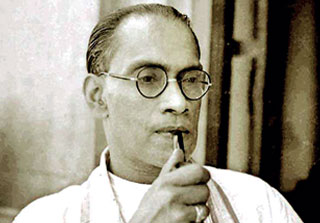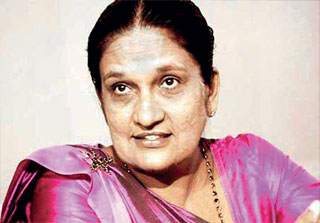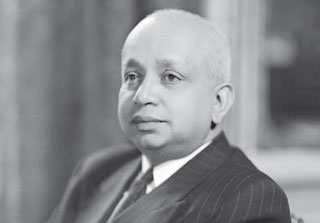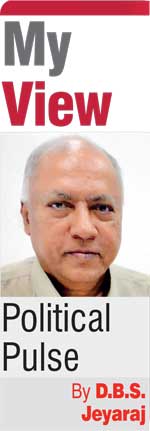Thursday Feb 19, 2026
Thursday Feb 19, 2026
Wednesday, 8 February 2023 00:30 - - {{hitsCtrl.values.hits}}

S.W.R.D. Bandaranaike

Sirimavo Bandaranaike

Sir Oliver Goonetilleke
|
 This article is the second in a new series by this column about the 1962 coup conspiracy. Last week’s article provided an outline of the coup conspiracy that aimed at seizing power through a well-coordinated exercise codenamed ‘Operation Holdfast’. A large number of top rung officers of the Army and Police were involved in the coup conspiracy. This week’s ‘Political Pulse’ will focus – with the aid of previous writings – on the background to the coup conspiracy with particular emphasis on the disgruntlement prevailing in the upper echelons of the Army and Police top brass then.
This article is the second in a new series by this column about the 1962 coup conspiracy. Last week’s article provided an outline of the coup conspiracy that aimed at seizing power through a well-coordinated exercise codenamed ‘Operation Holdfast’. A large number of top rung officers of the Army and Police were involved in the coup conspiracy. This week’s ‘Political Pulse’ will focus – with the aid of previous writings – on the background to the coup conspiracy with particular emphasis on the disgruntlement prevailing in the upper echelons of the Army and Police top brass then.
What did the 1962 coup conspirators want to do after capturing power? The simplistic plan was to dissolve Parliament and establish direct rule under the Governor-General Sir Oliver. He was to be assisted by a ‘Regency Council’ in which former Prime Ministers Dudley Senanayake and Sir John Kotelawela were to be members. Even Wijayananda Dahanayake and Sirima Bandaranaike being ex-premiers were to be invited to join this council. After a reasonable period of time fresh elections were to be called and an elected government installed.
It later transpired in courts that three phases were envisaged after a successful coup d’etat. The first phase after the coup would have been the imposition of a military dictatorship. The second phase was to be an ‘indirect democracy’ where a ‘Regency Council’ including ex-prime ministers would assist the Governor-General in ruling. The third phase was elections to Parliament after promulgating a new constitution ensuring justice and equality to all races and religions.
It appears that the coup conspirators had no intention of retaining power permanently. It is noteworthy that none of the three defence service chiefs or police chief were involved in the coup. Most of the officers involved were of senior rank.
Most involved were Christians
The coup was described jocularly by the colourful ex-prime minister of Ceylon Sir John Kotelawela as a ‘Buddhist’ coup. Sir John who had himself served in the Army during British rule called it Buddhist as the planners were obsessed by the idea that ‘not a drop of blood should be shed’. Ironically most of those involved in the attempted coup were not Buddhists but Christians. Except for a few the overwhelming majority of those charged in courts were Christians both Protestant and Catholic drawn from Sinhala, Tamil and Burgher and even Chinese communities.
What therefore impelled these Army officers and gentlemen who believed firmly in ‘duty, honour and country’ to violate their oath of allegiance to the democratically elected government of ‘her Majesty’ and technically ‘wage war against the Queen’ who at that time was the titular head of state? By the same token, why did senior Police officers conspire to bring about a regime change through a coup d’état? A simple answer would be that the 1962 coup conspiracy was the culmination of a series of events that progressively alienated the disgruntled Army and Police top brass from the ruling politicians and inculcated in them, a zealous fervour to save the country by resorting to such drastic action.
Several reasons could be attributed for this attempted coup but the premier cause was a state of mind which believed the ruling politicians were ruining the country through maladministration. The world’s first woman Prime Minister Mrs. Bandaranaike was regarded by the coup conspirators as someone unfit to govern and therefore had to be replaced in the larger interests of the country. The country was deteriorating due to bad governance, it was felt.
‘Esprit de corps’
The armed forces and Police steeped in British tradition had certain values and established standards. These norms of conduct built up a feeling of pride, fellowship, and common loyalty shared by the members of the army or police. This sense of camaraderie is summed up best by the French phrase ‘esprit de corps’ meaning literally ‘spirit of the body’. The Merriam-Webster Dictionary defines esprit de corps as ‘the common spirit existing in the members of a group and inspiring enthusiasm, devotion, and strong regard for the honour of the group’.
The rise of populist politics in Ceylon/Sri Lanka in the post-independence years saw the values cherished and standards maintained by the Army and Police being subjected to the whims and fancies of politicians. This was particularly so after the election of S.W.R.D. Bandaranaike as Prime Minister. The race-religion divide was being promoted within the Army and Police. This ‘decline and fall’ is illustrated by two separate incidents regarding the appointment of an Army chief and Police chief. In 1954 when Sir John Kotelawala was Prime Minister, a Tamil Christian was appointed as Army commander on the basis of merit and seniority. Sir John an ex-army officer himself welcomed it.
In 1959 when S.W.R.D. Bandaranaike was premier, the serving Inspector General of Police (IGP) was ousted. The next in line was a Sinhala Christian DIG followed by two more Christian DIGs. Bandaranaike brought in a Buddhist civil servant from ‘outside’ and appointed him to the post because he did not want a Christian IGP. Both these contrasting incidents will be related in greater detail later in this article.
Anton Muttucumaru
In the early years after Independence, the commanders of the Army, Navy and Air Force were all British nationals seconded for service in Sri Lanka. In the case of the Army, the first British commander was Brigadier James Sinclair, the Earl of Caithness. After him, a Scotsman Brigadier Sir Francis Reid took over. The next in line was Col. Anton M. Muttucumaru. Thereafter came Col. Winston Wijekoon. Muttucumaru was Tamil and Wijekoon Sinhala.
Moreover, Wijekoon’s father Sir Gerard Wijekoon was the president of the senate or upper house at the time. There was speculation then that Wijekoon may use his ethnicity and political clout to his advantage and supersede Muttucumaru and succeed Reid as the first Ceylonese commander of the Army. But when the subject was broached Wijekoon, regarded as a perfect gentleman dismissed it brusquely saying, “There is one ahead of me in the line of seniority who is perfectly capable of taking command. I will await my turn.”
Thus Anton Muttucumaru became the first Ceylonese Army commander and served from 1955-59. Wijekoon waited his turn and succeeded Muttucumaru and served from 1960-63. This was the situation then where race and religion was disregarded and only merit and seniority was considered. A far cry indeed from subsequent events where race and religion became the criteria determining posts and promotions!
‘Apey Aanduwe’ (Our Govt.)
1956 was a decisive year in which the United National Party (UNP) was voted out at the polls and the Mahajana Eksath Peramuna (MEP) coalition led by Solomon West Ridgeway Dias (S.W.R.D.) Bandaranaike was voted in. The victory was depicted as a people’s victory and the new government described as ‘Apey Aanduwe’ (our Govt.) began ushering in what was called then the age of the common man. When Parliament convened formally after the elections, hundreds of supporters of the new Government invaded the house by Galle Face Green. When the Police on duty tried to curb this unruly enthusiasm, they were severely reprimanded by the new Prime Minister.
The weak and vacillating PM began capitulating often to pressure groups and volatile individuals instead of instilling firm discipline. This went against the grain of the values and codes of conduct followed by the hierarchies of the armed forces, particularly the army.
A significant flashpoint of tension occurred in May 1956 within a few weeks of the new Government assuming office. Eighteen soldiers from the Artillery regiment deployed in Mannar went on a hunger strike protesting service conditions. They demanded that the Prime Minister himself intervene directly and redress their grievances. Instead of letting the army top brass deal with this insubordination SWRD helicoptered down to Mannar and negotiated with the fasting soldiers. He managed to get them to call off their protest fast but seriously dented military discipline.
Galle Face Green ‘Satyagraha’
Worse still was the escalation of the ethnic crisis. Sinhala was made the sole official language in June 1956. Tamil MPs and activists protesting against it peacefully through non-violent ‘Satyagraha’ on Galle Face Green were set upon by thugs and hooligans sponsored by ruling party politicians.
The Prime Minister reportedly ordered the Police not to intervene while mobs assaulted, stoned and manhandled unarmed Satyagrahis. When the injured Vaddukkoddai MP A. Amirthalingam with a bandaged head walked into the House, Bandaranaike sneered ‘Wounds of War’ to which the irrepressible Vavuniya MP C. Sundaralingam retorted ‘Honourable wounds of war’.
1958 communal violence
Then came the communal violence of May-June 1958. While mobs were unleashing violence against innocent civilians the Prime Minister dilly-dallied and loss of life, limb and property increased. In fact, an address to the nation by S.W.R.D. Bandaranaike actually helped to exacerbate the violence instead of quelling it.
A delegation of concerned MPs and citizens consisting of people like R.E. Jayatilleke, MP, A.H. Macan Markar, MP, Sir Razeek Fareed, MP, Dr. M.P. Drahaman, MP, Sir Arunachalam Mahadeva, Selwyn Sarnaraweera, Chairman, L.C.P.A., R.F.S. de Mel, Chairman, Sinhala Merchants’ Chamber, Devar Suriya Sena, Stephen Samarakkody, J. Tyagarajah and Dr. M.G. Perera met SWRDB and urged the PM to declare a state of emergency and call in the armed forces. Yet the premier dithered.
Ultimately, the Governor-General Sir Oliver Goonetilleke departed from protocol and called on the Prime Minister at his Rosemead Place residence. Sir Oliver ‘strongly’ urged the PM to act immediately. Finally, Bandaranaike complied.
After emergency was declared, Governor-General Sir Oliver Goonetilleke took hold of the reins of governance. Sir Oliver took full control and gave clear orders to the armed forces. “Clear them out even if you have to sh-sh-sh-shoot them,” he instructed in the presence of the media. The Army and Navy then went into action. In Ratmalana the Army led by Col. F.C. De Saram fought a pitched battle with a well-armed mob near the CTB bus depot. The Navy opened fire on mobs and cleared the Fort and Pettah areas. The Navy chief Royce de Mel supervised the operation personally. Gradually the Army, Navy together with the Police quelled the violence and ensured island-wide security. Sir Oliver and the armed forces saved the country and its people then. The deplorable conduct of ‘Sol Banda’ (as SWRDB was referred to by Tarzie Vitachchi) was roundly criticised in the Army and Police barracks and mess halls.
Even though the officers of the armed forces discharged their duties without fear or favour and established law and order many of them were disgruntled. They felt that a communal conflagration need not have occurred at all in the first place. They felt that S.W.R.D. Bandaranaike’s mis-governance and meek capitulation to communal forces was at the root of these troubles. They also felt he had mishandled and aggravated the situation. While the gentlemen officers of the Army were seething with discontent, S.W.R.D. Bandaranaike upset the Police Force also through blatant political interference of both a political and communal nature.
By whipping up Sinhala Buddhist chauvinism to win the 1956 elections, S.W.R.D. Bandaranaike had unleashed resentment and hatred towards Tamils and Christians. There was Sinhala-Tamil friction on the one hand and a Buddhist-Christian schism on the other. An incident concerning a senior Police officer illustrated this state of affairs well.
A.C. Lawrence ASP
There was a move by the Catholic Church to construct a new church in Maradana, Colombo. It was opposed by some Buddhist sections. An organised mob protested vehemently at the building site. When there were signs of violence, a senior Police officer got his men to disperse the mob through force. He also set up an emergency Police post at the spot. The officer was Asst. Supt. of Police A.C. Lawrence who was a Tamil Catholic. Buddhist organisations began condemning the ‘Tamil Catholic’ Officer. The Prime Minister wanted the IGP Osmund de Silva to take disciplinary action against Lawrence. The IGP refused but the PM kept insisting. So the IGP reluctantly transferred Lawrence out. This caused much dismay within the Police Force.
IGP Osmund de Silva
Osmund de Silva the Inspector General of Police too fell foul of the Prime Minister soon. This was due to the conscientious Osmund refusing to carry out inappropriate orders of the Prime Minister. It is a tale worth recounting today at a time when the country’s Police Force particularly senior Police officers are accused of being minions of their political masters. Osmund de Silva had been serving as the IGP since 1955. There was a wave of strikes in 1959 that plagued the Bandaranaike-led Government. The situation was particularly acute in the Colombo Port sector where leftist-led trade unions dominated.
An exasperated S.W.R.D. Bandaranaike summoned IGP Osmund de Silva and asked him to break up the strike, arrest the trouble-making trade unionists and lock them up. Osmund de Silva refused point blank saying there were no grounds to arrest them unless the Police ‘cooked up’ something and that doing so would be unlawful. The Premier then said he expected extra loyalty from the IGP to which Osmund de Silva replied that his loyalty was first and foremost to the law of the land. An angered Bandaranaike sent Osmund de Silva on compulsory retirement on 24 April 1959. Osmund de Silva convened a hasty conference of senior Police officials and related details of the incident with the Prime Minister and departed proudly after reiterating to his fellow police officers to always uphold the law and not adopt extra-legal measures at the behest of politicians
Though S.W.R.D. Bandaranaike wanted to oust Osmund de Silva permanently as IGP there was a hitch. Osmund was a Buddhist and the first Buddhist Inspector General of Police at that. The senior Deputy Inspectors General of Police in line to step into his shoes were all Christians. DIG C.C. Dissanayake (Jungle), his brother DIG S.A. Dissanayake (Jingle) and DIG Sidney de Zoysa. The Sinhala Buddhist associations of the laity and clergy opposed Osmund de Silva’s removal on the grounds that he was a Buddhist and that his successor would be a Christian.
“If only you were a Buddhist”
A tremendous outcry was launched on behalf of the first Buddhist IGP. S.W.R.D. Bandaranaike who had been born and baptised as an Anglican before reverting to Buddhism was somewhat sensitive to this criticism by the Buddhist lobby. He reportedly exclaimed to C.C. Dissanayake, “Oh Jungle, jungle, if only you were a Buddhist.”
SWRDB wanted Osmund de Silva out but did not want any of the Christian DIGs to become IGP. His idea was to bring in someone from outside and make him IGP. His choice was a civil servant M.W.F. Abeykoon. This was flagrant political interference in the affairs of the Police. The Police top brass was aghast at this.
The senior DIGs were united in opposing an outsider. The senior Police officers irrespective of racial and religious differences met together and discussed the situation. One idea mooted was for all senior Police officers to resign en masse in symbolic protest. It was however ruled out because such drastic action could demoralise the Police service and trigger off a major calamity.
Stanley Senanayake SP
Since the Premier was vehemently insisting that a Buddhist should be made IGP the senior Christian DIGs in a remarkable gesture resolved to shelve their rightful claim and opt for a viable alternative. They decided to select the senior-most Buddhist police officer in service and ask the Prime Minister to appoint him as the IGP and pledge to serve under him diligently. The senior-most Buddhist Police officer in service then was Stanley Senanayake who was a Police Superintendent (SP). He had joined the police force as an Assistant Superintendent of Police (ASP) in 1943.
Now in a rare and exemplary gesture, the senior police officers were prepared to work under the comparatively junior Stanley Senanayake rather than work under an outsider parachuted into office. This was because they valued the service and had the best interests of the Police at heart. Despite this show of solidarity by the Police top brass a stubborn Bandaranaike declined to appoint Stanley Senanayake as IGP. SWRD went through with his brazen decision to make Abeykoon the IGP. The overlooked C.C. ‘Jungle’ Dissanayake immediately tendered his resignation but later withdrew it.
Walter F. Abeykoon was a respected civil servant who was SWRDB’s personal friend and partner at bridge. He was appointed IGP on 1 May 1959, by Bandaranaike. Later events demonstrated that this was a grave blunder as Abeykoon proved himself incompetent and incapable of discharging his duties as IGP efficiently.
There was much heartburn within the Police top brass as a result of the new appointment. The consideration of religion over merit and seniority had upset many. Moreover Buddhist-Christian relations in the country were also deteriorating just like Sinhala-Tamil relations.
Disgruntled top brass
Moreover the SLFP Government was using the Police and Armed Forces to suppress legitimate, non-violent protests by Catholics over the schools takeover issue and Tamils resisting Sinhala as the sole official language imposition through peaceful ‘Satyagraha’. Furthermore Army top brass was disgruntled about the Sirima Bandaranaike Government combatting workers’ strikes by declaring them essential services and deploying defence personnel as substitutes for workers.
(The writer can be reached at [email protected].)